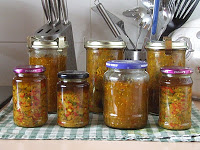The probability of an economic shock is increasing month-by-month or even day-by-day due to Peak Everything, and as described in previous Suburban posts it is a very good idea to act while we have time to prepare for energy descent amongst other major issues.
If we are resource or space poor there are many skills that can be learnt to prepare. As we will need to be increasingly frugal mainly for one of two reasons, which applies not only to suburbanites, but to anyone reading. These two reasons are to free up capital to rapidly pay down debt, or to survive on a low income base.
I am pursuing frugality, which I believe is subset of sustainable living for the first reason, to rapidly pay down debt. Debt in the form of a mortgage and to accumulate a large enough ’emergency fund’ for any unexpected circumstances. However that is not to say that our present circumstances could not turn 180 degrees in a heartbeat. It would only take another slump in the Australian economy to reverse my good fortune.
So, what skills are important? I believe that home-making is the ultimate skill set required to live comfortably in energy descent, once the basics of food, water and shelter are taken care of. In fact these skills complement or in some way, shape or form utilise all three. Lets go through a few of them.
Cooking from scratch: cooking is not reheating food that has been pre-packaged, as some may think these days. It is the art of taking raw ingredients, and with the addition of key ingredients, turning it into a gastronomic and mouth watering delight. Cooking does not have to be fancy, but it does have to be nutritional, if one is to survive without illness. Cooking skills are often passed on from generation to generation, however in all the consumer culture craziness we seemed to have skipped this vital skill. How you learn it is up to you, but what ever you do, learn it quickly. No pressure of course!
Menu Planning: This skill is essential when deciding what to cook from scratch. If you have the land to grow your own, then it is important to use ingredients for meals from the garden first, before purchasing additional foodstuffs from elsewhere. Then workout what meals are going to be provide you with the nutrition that you need, with in your means so that you can buy, barter or swap food that you need. You will save cash doing this as well.
Cleanliness: Hygiene is vitally important to ensure good health, however as all of the current chemical cleaners are by products of fossil fuels, we will need to think of alternatives. Did you know that even some white vinegars are made from petroleum by-products? So what can we use? Home made soap can be made from animal fats and/or vegetable oils, and a lye alternative which is the last ingredient for soap (potassium hydroxide) can be made at home as well. (http://www.wikihow.com/Make-Lye). Home made soap can be used to wash and clean just about everything. If you can get a ready supply of soap nuts, they would be a great alternative as well.
Sewing and mending: I learnt this invaluable skill in the navy, when I didn’t have much choice but to fix my uniform for myself. Buttons, hems, and holes in socks were part of kit maintenance, and I still darn my woollen socks to this day. Clothes making is also a valuable skill, however I leave that to my wife and two daughters.
Knitting: This is a skill the no one in our family unit has really mastered, however if push comes to shove, Kim has mastered the basics from her mum last time she visited. I knitted a scarf once when I was in high school, so it cannot be too difficult.
Preserving: From jam making to pickling and all things in-between, we need the skills to preserve food when we have excess. I do worry about shortages of sugar and vinegar, so wonder how we would make some preserves, however preserving fruit and some vegetables are easy enough with just water and citric acid (lemon juice) in a water bath or via pressure canning.
Making ends meet: We never thow away any left overs, however when we use them in the next meal, they rarely resemble their original form. Using leftovers is a skill in itself. Another example of this is to reuse or re-purpose things so that it gets a second life. I find plastic bucket laying around building sites and bring them home to use around the yard. You can never have enough plastic buckets, however they do breakdown with exposure to sunlight. I also find bits of wood laying around, that I can either construct something with, or burn in the oven. Be careful and make sure that you do not burn any CCA treated pine, as the smoke is toxic. Just a few examples, and there are many hundreds more. I have a ready reference Reader’s Digest book called “Extraordinary Uses for Ordinary Things” that I often refer to when I get stuck to find a second life for some item.
Budgeting: This is a vital skill if we are to live within our means, so what ever your cash flow circumstance, you should always have a budget. Kim does our budget for our family, and makes sure that we allocate savings first, then divides the rest up into whatever outgoings we need to pay. Then any spare at the end of the pay cycle is put towards debt reduction as well. It is usually pretty tight, but we have yet to come unstuck because our consumption is minimal due to our sustainable lifestyle.
These are probably the main home-making skills I can think of, however if you want to learn more, then I can highly recommend either Rhonda Hetzel’s Down to Earth blog, or the Simple, Green, Frugal Co-op for further reading. There are probably many more that I have missed, so if you have any ideas, please leave a comment so that all readers can learn from your valuable experience and skills.
Tomorrow, I will be writing about home maintenance skills that I think are necessary to live well in energy descent. Not that I have mastered all of them yet, but I continue to apply myself at this quest.
Now everyone cannot learn everything, but the basics are always a good place to begin.


Hi Gavin
I have shown your blog to a few ladies at work. All were admiring your cob oven.
I am trying to get our house in order. it takes a shift in the brain. I am working on that in our house. The garden is a start. As is us both changing jobs and one working from home, the other close by.
I greatly enjoyed the interview with Vasili. And to see your gardens as you showed him around.
I was lucky enough as a child to live very close to Totnes, so I have seen this close up and personal. My partner needs a few more nudges and some more workshops. it will all come together.
Thank you for these posts. I feel he is actually starting to listen. And it isnt just some “crunchy woman thing”.
If you have apples you can not only make cider but also cider vinegar.
This is a great post. I’ve been very much in this headspace myself lately, aware that I need to make sure my teenagers arrive in adulthood ready to cope in their own homes. I would add to the preserving section that dehydrating works well for many foods, and far less water involved (only for rehydrating if needed). Not for all foods, but a variety of techniques makes for better food security. I would also add the need for handyman skills. The ability to bang together a rabbit hutch, or fix a bicycle, even build a clay oven (grin!). Even people whose handyman skills are more petroleum oriented (car buffs, etc) are probably better off, since they have an abiltiy with tools and a mindset for problem solving that others will lack.
@ Sol. Thanks for sharing the love. Glad I can help influence your hubby! I try my best 😉
@ Soewnearth. I hope to have lots of apples this year, and I am going to try to make cider, so vinegar will be on the cards as well. Thanks for reminding me.
@ Dawn. Cheers. Getting teenagers to do anything is a chore, however I have found that if I keep nudging them in the right direction, they come around eventually. I am going to cover outdoor skills in the next post.
Gav x